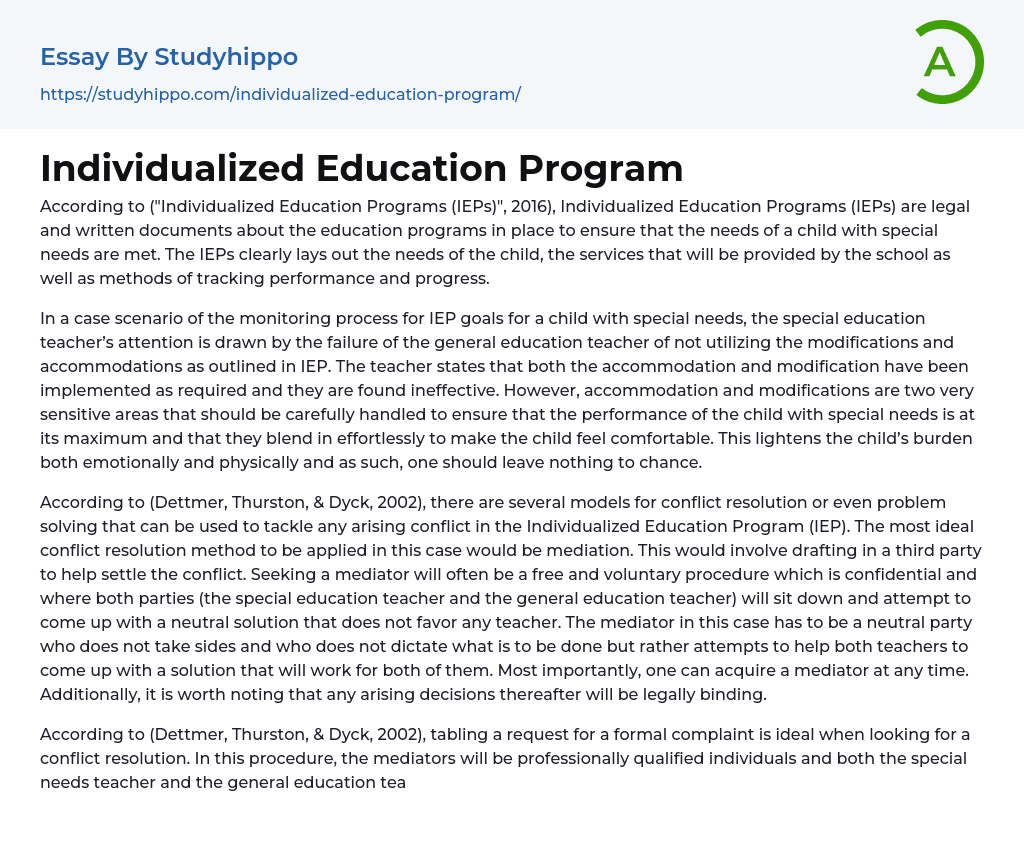According to "Individualized Education Programs (IEPs)", 2016, Individualized Education Programs (IEPs) are legal and written documents that outline education programs created specifically for children with special needs. These programs clearly define the child's needs, the school services provided, and the methods used to track progress. In a scenario where IEP goals for a child with special needs are being monitored, the special education teacher becomes concerned when they observe that the general education teacher is not using the modifications and accommodations specified in the IEP. The general education teacher claims to have implemented both the accommodation and modification requirements but finds them ineffective.
When it comes to accommodating and modifying the education of children with special needs, it is important to handle the situation carefully in order to optimize their performance and ensu
...re their comfort. According to (Dettmer, Thurston, ; Dyck, 2002), there are various models for resolving conflicts in an Individualized Education Program (IEP). In this case, mediation proves to be the most suitable approach as it involves a neutral third party who assists in settling the conflict. Mediation is a voluntary and confidential process that encourages collaboration between the special education teacher and general education teacher in finding a fair solution that satisfies both parties.
In this situation, the mediator plays a crucial role as an unbiased party who does not take sides or impose decisions. Rather, they assist both teachers in finding a mutually agreeable solution. It is important to note that a mediator can be sought at any time, and any decisions made through mediation are legally binding. According to (Dettmer, Thurston, ; Dyck, 2002), it is recommended to initiate a formal complain
request for conflict resolution. This process involves professionally qualified mediators and requires the support of both the special needs teacher and general education teacher for scheduling.
Non-compliance would lead to the cancellation of plans that involve a mediator. The teachers and the mediator will collaborate to determine how accommodations and modifications can be best utilized for the benefit of children with special needs. This approach aims to prevent any teacher from having an advantage due to a decision. Instead, decisions are made through dialogue and extensive consultations, considering all available facts and evidence.
Once the special needs teacher and general education teacher come to an agreement, it becomes legally binding. The mediator can then conclude the discussions when both teachers are satisfied with resolving their issues. Additionally, if the child's needs are not being met, the mediator has the authority to prioritize the child's concerns over those of the teachers.
References
- Dettmer, P., Thurston, L., ; Dyck, N. (2002). Consultation, collaboration, and teamwork for students with special needs (1st ed.). Boston: Allyn and Bacon.
- Individualized Education Programs (IEPs). (2016). Kidshealth.org.
Retrieved 2 December 2016, from http://kidshealth.org/en/parents/iep.html
- Bachelor's Degree essays
- MBA essays
- College Life essays
- Grade essays
- Diploma essays
- Academia essays
- Academic And Career Goals essays
- Academic Integrity essays
- Brainstorming essays
- Brown V Board of Education essays
- Brown Vs Board Of Education essays
- Coursework essays
- Curriculum essays
- Distance learning essays
- Early Childhood Education essays
- Education System essays
- Educational Goals essays
- First Day of School essays
- Higher Education essays
- Importance Of College Education essays
- Importance of Education essays
- Language Learning essays
- Online Education Vs Traditional Education essays
- Pedagogy essays
- Philosophy of Education essays
- Purpose of Education essays
- Scholarship essays
- Study essays
- Studying Abroad essays
- Studying Business essays
- Technology in Education essays
- The Importance Of Higher Education essays
- Vocabulary essays
- Writing Experience essays
- Coaching essays
- Critical Thinking essays
- homework essays
- Learning essays
- Library essays
- Listening essays
- Literacy essays
- Mentor essays
- Physical Education essays
- Project essays
- Reading essays
- Research essays
- Sex Education essays
- Social Studies essays
- Standardized Testing essays
- Study Plan essays




